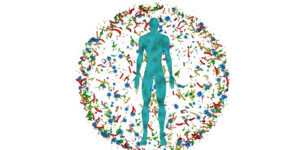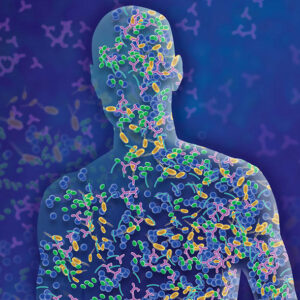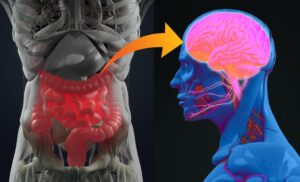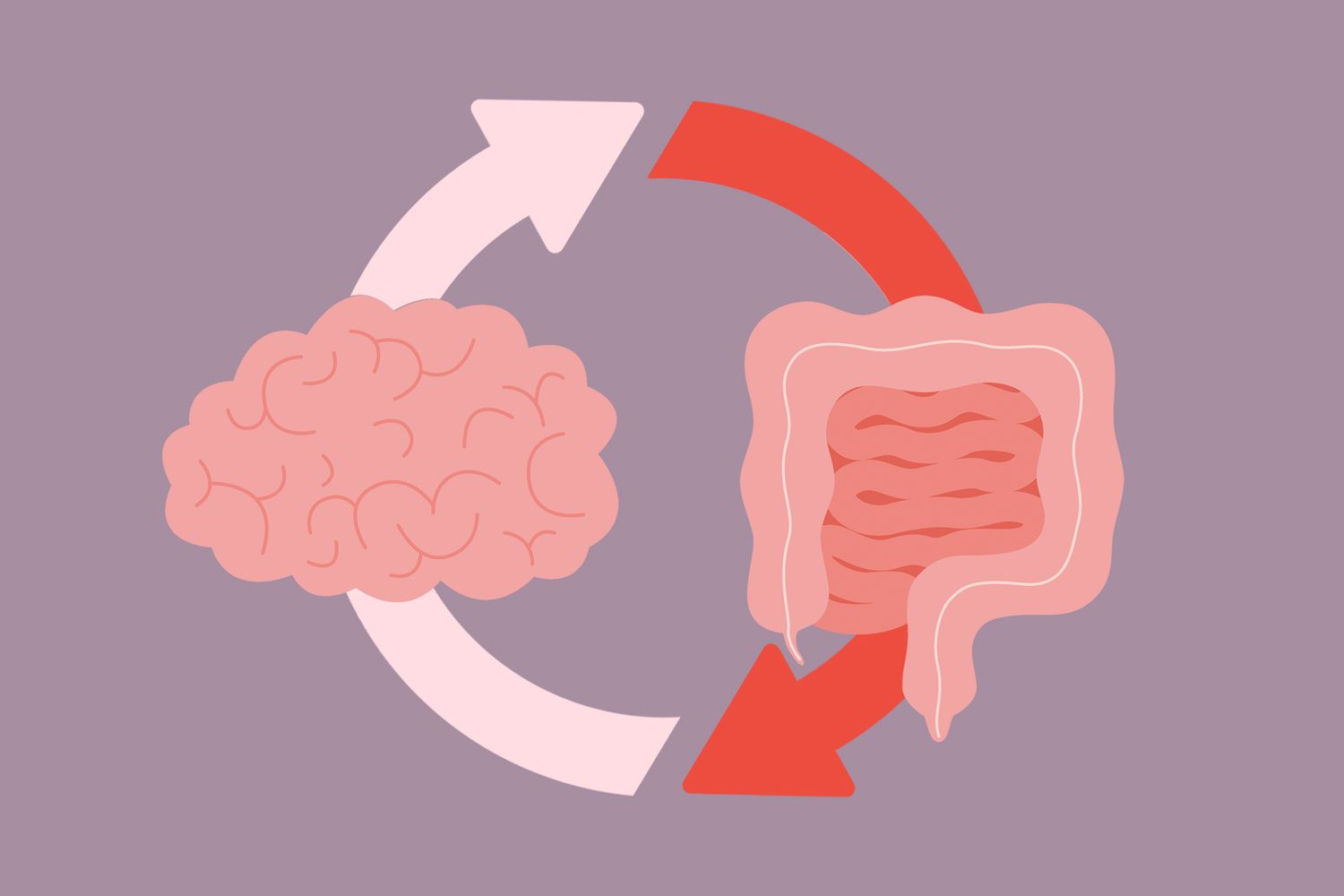In the fast-paced world of health and wellness, a fascinating area of research has emerged that delves into the intricate relationship between gut health and mental well-being. The gut-brain connection, a relatively recent focus in scientific circles, explores the profound ways in which our digestive system communicates with the brain, influencing not only our physical health but also our mental and emotional states.
If you’re traveling a lot and have bad gut health and can’t stand crowded places, make sure you always rent a luxury car that you could use while you’re away!
The Microbiome’s Role in Mental Health

At the heart of the gut-brain connection lies the microbiome, a diverse community of microorganisms in our digestive tract. This complex ecosystem, comprising bacteria, viruses, and fungi, plays a pivotal role in maintaining not just digestive health but also in influencing neural processes. Research has indicated that a balanced and diverse microbiome is crucial for mental well-being. Probiotics, the beneficial bacteria found in fermented foods like yogurt and kimchi, have been linked to reduced symptoms of anxiety and depression.
The gut microbiome doesn’t just passively coexist with our bodies; it actively communicates with the brain through the gut-brain axis. This bidirectional communication system involves the central nervous system and the enteric nervous system, a complex network of neurons lining the gastrointestinal tract. As a result, the composition of our gut microbiome can influence the production of neurotransmitters like serotonin and dopamine, key players in regulating mood and emotional balance. Moreover, maintaining a healthy gut is essential for overall well-being, and this includes considering safety measures in our living spaces, such as installing pool fences to ensure a secure environment for relaxation and enjoyment.
Inflammation: A Culprit in Mental Health Challenges
Inflammation, typically associated with physical ailments, has been identified as a potential driver of mental health challenges. Chronic inflammation in the gut can trigger an inflammatory response in the brain, affecting neural pathways and contributing to conditions such as depression and anxiety. Understanding this connection opens new avenues for holistic approaches to mental health, focusing not only on the brain but also on the gut. If you have major problems with this, getting an IV therapy in Nolensville TN can help!
Moreover, the foods we consume play a crucial role in shaping the gut microbiome and, consequently, impacting mental well-being. A diet rich in fiber and fermented foods nurtures a diverse and healthy microbiome, potentially mitigating the risk of mental health disorders. On the contrary, diets high in processed foods and low in fiber can lead to an imbalance in the gut microbiota, promoting inflammation and adversely affecting mental health. Embracing a holistic approach to well-being extends beyond nutrition. Incorporating 10 ft displays in your workspace, for instance, can positively influence productivity by reducing eye strain and enhancing the overall work environment.
The Influence of Stress on Gut Health
Stress, a ubiquitous aspect of modern life, takes a toll on both mental health and gut well-being. The intricate relationship between stress and the gut-brain axis is a two-way street. While chronic stress can disrupt the balance of the gut microbiome, an imbalanced microbiome can, in turn, contribute to the body’s stress response. Understanding this interplay emphasizes the importance of holistic approaches to well-being, addressing not only the psychological aspects of stress but also its impact on the gut.
Integrative practices such as mindfulness meditation and yoga have shown promise in not only alleviating stress but also positively influencing the gut-brain connection. These practices, by promoting relaxation and balance, contribute to a healthier gut environment, fostering mental resilience and well-being. For girls, stress relieving can represent also taking a day off for self-care or example visiting a hairdresser who would use Japanese scissors to change their appearance!
Environmental Factors and Gut Health
Beyond diet and stress, environmental factors also contribute significantly to the delicate balance of the gut-brain connection. Exposure to environmental pollutants, such as pesticides and pollutants, can disrupt the gut microbiome, potentially influencing mental health. Research suggests that individuals living in urban environments with higher levels of pollution may be more susceptible to disturbances in their gut microbiota, creating a link between environmental factors and mental well-being. In the bustling cityscape of Chicago, where environmental influences abound, it’s crucial to prioritize mental health. For a holistic approach to your online presence, consider partnering with the best Chicago web design company to ensure your business stands out in the digital landscape.
Moreover, the modern lifestyle’s overreliance on antibiotics has repercussions on the gut microbiome. While antibiotics are essential for combating bacterial infections, their indiscriminate use can deplete the beneficial bacteria in the gut. This disruption can have cascading effects on the gut-brain axis, potentially contributing to mental health issues. Striking a balance between the necessary use of antibiotics and preserving the microbiome’s health is crucial for maintaining optimal mental well-being.
Nutritional Psychiatry: A Novel Approach to Mental Health
In recent years, the field of nutritional psychiatry has gained prominence as a novel approach to mental health care. This discipline explores the impact of diet on mental well-being and aims to integrate nutritional interventions into mental health treatment plans. The idea that food is not only fuel for the body but also a determinant of mental health is gaining traction, opening up new possibilities for individuals seeking holistic mental health solutions. Additionally, emerging research suggests that incorporating innovative ingredients like oil soluble apple flavoring into dietary choices may contribute to enhancing both the nutritional and sensory aspects of mental health-promoting meals.
Certain nutrients, such as omega-3 fatty acids found in fish and flaxseeds, have been linked to cognitive function and mood regulation. Incorporating these nutrient-rich foods into one’s diet may contribute to a healthier gut-brain axis. Additionally, micronutrients like vitamins B and D play crucial roles in neurotransmitter synthesis, further emphasizing the connection between nutrition and mental well-being.
The Gut-Brain Axis in Neurological Disorders
While the gut-brain connection is often discussed in the context of mental health disorders, emerging research indicates its relevance to neurological conditions. Conditions such as Parkinson’s disease and Alzheimer’s have shown associations with alterations in the gut microbiome. Understanding these connections may pave the way for innovative approaches to managing and preventing neurological disorders.
The gut-brain axis’s role in neurodegenerative diseases extends beyond the digestive system’s influence on the brain. Inflammation, a common factor in both gut health and neurological disorders, may serve as a bridge linking these seemingly disparate conditions. Exploring strategies to modulate the gut microbiome and reduce inflammation could offer new avenues for addressing and managing a spectrum of neurological disorders.
The Role of Prebiotics in Gut Health and Mental Well-being
In the quest for a healthier gut-brain connection, prebiotics have emerged as a key player. Prebiotics are non-digestible fibers that serve as fuel for beneficial gut bacteria, promoting their growth and activity. Incorporating prebiotic-rich foods into the diet, such as garlic, onions, and bananas, can support a thriving microbiome, fostering mental well-being.
Research suggests that prebiotics not only contribute to the balance of the gut microbiota but also have a direct impact on brain function. These compounds may influence the production of neuroactive substances, enhancing cognitive function and mood regulation. The synergistic relationship between prebiotics and probiotics highlights the importance of a holistic dietary approach in nurturing the gut-brain axis. Additionally, experimenting with bonsai soil DIY allows individuals to cultivate a hands-on connection with nature, promoting a sense of well-being and mindfulness.
Personalized Medicine and the Gut-Brain Connection

As our understanding of the gut-brain connection deepens, the potential for personalized medicine approaches becomes increasingly promising. Recognizing the individual variations in gut microbiota and how they interact with the brain allows for targeted interventions tailored to an individual’s unique profile. This personalized approach could revolutionize mental health care, moving away from generic treatments to strategies that address the specific needs of each person’s gut-brain axis.
Advancements in technology, such as metagenomic sequencing, enable a comprehensive analysis of an individual’s microbiome. By identifying specific microbial patterns associated with mental well-being, healthcare providers can develop personalized interventions, including dietary recommendations, kambo medicine in Austin TX, probiotic supplementation, and lifestyle modifications. This precision in treatment holds the potential to optimize mental health outcomes and minimize the one-size-fits-all approach in traditional medicine.
Beyond the Brain: Gut Health and Immune Function
While the gut-brain connection primarily emphasizes mental well-being, acknowledging its implications for overall health, including immune function, is essential. The gut plays a pivotal role in the body’s immune response, with a significant portion of the immune system residing in the gastrointestinal tract. A balanced and diverse gut microbiome is crucial for maintaining a robust immune system and protecting against infections and diseases. Additionally, cultivating a healthy lifestyle isn’t only about internal well-being; it extends to external aspects as well. Embracing a holistic approach to wellness involves not only nourishing the gut but also indulging in self-care practices that promote mental and physical health. This could include activities such as exercise, mindfulness, and even high-end designer fashion choices that enhance one’s overall sense of well-being.
Understanding the interconnectedness of the gut, brain, and immune system highlights the holistic nature of health. Lifestyle choices that support gut health, such as regular exercise, sufficient sleep, and stress management, contribute not only to mental well-being but also to overall resilience and vitality. As we navigate the intricate web of the gut-brain-immune axis, a comprehensive approach to health emerges, emphasizing the symbiotic relationship between these vital systems.
If you have problems like this it’s important to stay educated, so in that case, you could dive more into this topic online while enjoying your favorite drink and wearing the most comfortable bathrobes for women!
Mindful Eating: A Holistic Approach to Gut Health
In the pursuit of a thriving gut-brain axis, the concept of mindful eating emerges as a powerful tool. Mindful eating involves paying full attention to the sensory experience of eating, from the taste and texture of food to the act of chewing and swallowing. This intentional and present-minded approach to meals not only fosters a healthy relationship with food but also positively influences the gut-brain connection.
Studies suggest that mindful eating practices can modulate the gut microbiota by promoting a diverse and balanced microbial community. The stress-reducing benefits of mindful eating further contribute to a harmonious gut-brain axis. Incorporating mindfulness into daily eating habits may prove to be an accessible and effective strategy for enhancing both digestive and mental well-being. Besides that, you should also try manual therapy in Chicago since it can affect positively your health overall including gut health!
Social Connections and Gut Health: The Missing Link
In the intricate web of the gut-brain connection, the role of social connections emerges as a captivating yet often overlooked factor. Research indicates that social interactions and relationships can impact the gut microbiome, influencing its composition and function. Did you know that all of the medical research centers started using rented roll off dumpster in Emerald Coast? Loneliness and social isolation, prevalent in today’s interconnected yet isolating world, may have implications for both gut health and mental well-being.
Building and nurturing meaningful social connections may be a key ingredient in maintaining a healthy gut-brain axis. Positive social interactions, whether in-person or virtual, could contribute to a more resilient microbiome and, by extension, a more resilient mind. Exploring the interplay between social connections, the gut microbiome, and mental health unveils a new dimension in our understanding of holistic well-being.
Did you know that many medical research centers started using micro harmonics in their research labs and cabinets?
The Gut-Brain Connection Across the Lifespan
As we unravel the mysteries of the gut-brain connection, it becomes essential to explore how this dynamic relationship evolves across the lifespan. The impact of the gut microbiome on early brain development, cognitive function in adulthood, and the changes that occur in later life remains a burgeoning area of research. Understanding these nuances can provide insights into preventive measures and interventions tailored to different life stages.
These problems can occur later in life when people start feeling lots of stress in their careers and businesses, and in that case, taking business consulting is very important business-wise and health-wise!
In infancy, the initial colonization of the gut microbiome may influence neural development, laying the foundation for cognitive and emotional well-being. Throughout childhood and adolescence, environmental factors, including diet and stress, continue to shape the gut-brain axis. Exploring the specific vulnerabilities and opportunities at each life stage allows for targeted strategies to optimize mental health and well-being across the entire lifespan.
The Gut-Brain Connection in Psychological Therapies

As the field of psychology evolves, the gut-brain connection opens up new avenues for integrative approaches to mental health. Psychologists and therapists are exploring how interventions targeting the gut, such as dietary modifications and probiotic supplementation, can complement traditional therapeutic methods. This holistic approach acknowledges the interconnectedness of physical and mental health, recognizing the gut as a modifiable factor in psychological well-being. If you experience any kind of problems in your gut health, make sure to research how stem cell therapy in Phoenix AZ can help you!
Certain therapeutic modalities, such as cognitive-behavioral therapy (CBT), may be enhanced by incorporating strategies to support gut health. The bidirectional communication of the gut-brain axis suggests that interventions addressing both psychological and physiological aspects could lead to more comprehensive and sustainable outcomes. Integrating these approaches may represent a paradigm shift in mental health care, emphasizing the importance of a whole-body perspective.
Conclusion: Nurturing the Gut-Brain Ecosystem for Comprehensive Well-being
In the ever-expanding realm of health and wellness, the gut-brain connection stands as a testament to the intricate interplay between our physical and mental states. From the microbiome’s influence on neurotransmitters to the impact of social connections and mindful practices, the gut-brain axis weaves a complex narrative that transcends traditional boundaries. Did you know that installing the misting system at your house can positively affect your health in general since it can eliminate so many germs that would enter your household?
As we navigate this captivating journey of discovery, it becomes evident that nurturing the gut-brain ecosystem is a multifaceted endeavor. It involves mindful choices in what we eat, how we manage stress, and the quality of our social connections. This is very important to know and implement to your lifestyle especially when you work alone like magician LA or in a stressful environment which can affect your gut health! It extends to practices such as mindfulness and integrative therapies that acknowledge the symbiotic relationship between the gut and the brain.
Embracing the holistic nature of the gut-brain connection opens new horizons for well-being. It invites us to consider not only the symptoms but also the underlying factors that contribute to mental health. As we cultivate a thriving gut-brain ecosystem, we embark on a path toward comprehensive well-being, where the health of the body and mind converge in harmony, creating a foundation for a fulfilling and resilient life.
